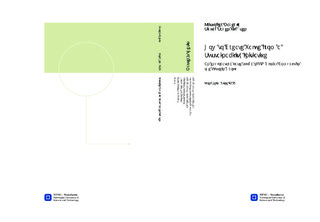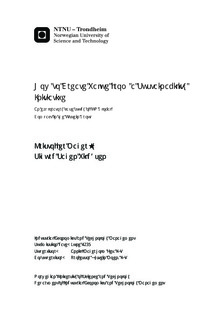| dc.description.abstract | From a management perspective, sustainable development concerns how to create social and environmental value in a way that also benefits economic value creation. Furthermore, managers need answers on such ?how?-questions following a prescriptive approach. In this context, further studies are needed because the empirical literature gives an unclear picture when it comes to cause-and-effect relations and managerial recommendations in general.This thesis utilizes findings from the Ulstein Group obtained during a period where the company has been evaluating membership in UN Global Compact (UN GC). UN GC is a sustainability initiative that comprises ten principles within areas of human rights, labor, the environment and anti-corruption, to which companies commit. A company that becomes a member is obligated to communicate their progress on these issues annually. The main purpose of this study was to investigate how a company can implement the UN GC principles in order to achieve long-term benefits. Using the Ulstein Group and UN GC as units of analysis, a qualitative and exploratory investigation was conducted. Seventeen semi-structured interviews were used as main source of empirical data. The study was scoped in a way that emphasized the environmental principles of UN GC along with the obligation of transparent communication. Furthermore, the implementation process was analyzed by applying a theoretical framework that emphasizes organization acceptance as a separate implementation goal. Regarding implementation of the environmental principles of UN GC, the strategies of pollution prevention and product stewardship reflect conceptual relations to increased economic value creation. The former has gained most empirical support, mainly caused by its linkages to continuous improvement and resource efficiency. The latter is product oriented and based on stakeholder integration. The findings suggest that product stewardship is successful only if the willingness to pay among customers is in place, and in the maritime industry, this seems to be missing to some extent at present. Transparent and honest communication can facilitate corporate reputation because it signals quality. However, when relieving information about failures and delays, a company must ensure that an action plan is in place and that resources are allocated in order to address the challenges. From a strategic point of view, the goal would be to convince stakeholders that the company is a proactive industry actor that learn from its mistakes. The study pinpoints that organizational acceptance is especially important when it comes to sustainability initiatives because employees will most likely have difficulties seeing business relevance and relations to their daily tasks. Therefore, it seems crucial that management first relate the new activities to existing policies within business ethics and for instance health, safety and environment in order to pinpoint relevance. Second, it is likely to achieve acceptance if employees are involved throughout the implementation process. Objectives and concrete measures should be developed using interdisciplinary groups and employees on different organizational levels. Furthermore, the findings indicate that people working towards customers or suppliers would see possible benefits more easily than those who are working closely with project deliveries and production tasks. Regarding the strategy of pollution prevention, it seems clear that concrete performance indicators must be developed in order to get successful outcome. This would also show business relevance more clearly, and hence be advantageous when aiming for acceptance among employees that work with production or other tasks linked to daily operations. However, the main point is not such indicators in themselves, but how they are introduced to the organization. Ownership is needed which again would facilitate motivation and engagement among employees. The key point is to give new activities attention and follow them up at different levels within the organization, so that value creation in practice can take place. | nb_NO |

